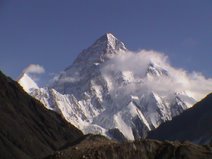
FROM THE BARREL OF THE GUN
November 6, 2006
Reviewer: Syed Farooq Hasnat
In his bibliography General Pervez Musharraf has presented himself as a staunch ally of the United Sates, in the war against terror and even beyond. His perception and conviction is that not only he is invincible but also irreplaceable, as long as he gets the blessings of the Bush administration. His intentions are clear and vocal. He shows no interest nor relates to the sentiments of his countrymen and does not look for a popular support from the domestic scene. His authority comes from the barrel of the gun and that suffice him.
In his book Musharraf stands out as a person who lacks discipline and sensibility. He proudly tells us, in a most sadistic manner, at least two instances while he was growing up. One is in which he and his friends bullied an elderly bald person and second his blasting an explosive at the house of aging and weak warden. He shows no regrets for these rather inhuman acts. The reader is also astonished to learn the lack of discipline the writer admits while he was in the army - one being a clear case of cheating and another was walking away from a highly tense situation at the borders in 1965. One wonders that how such a person achieved the distinction of being the commander in chief of the armed forces. It is no wonder that when the elected Prime Minister fired him, he refused to be removed and staged a military coup, instead.
In his bibliography General Musharraf informs the reader about the misadventure of Kargil and stresses that he informed the then Prime Minister, Nawaz Sharif about his plans to take possession of the Indian held territory in Kashmir. Nawaz Sharif on his part refutes Musharraf's side of the story by saying that he was never informed of the plans about Kargil. A close analysis of the events show that it was General Musharraf's idea to move ahead and he did so without adequate planning or assessing the fallout of the military action. It remains doubtful if he ever thought fit to inform the Prime Minister because in his judgment, as we gather from other sources, the Army was beyond the civilian control and that he was not answerable to the people's representatives.
General Musharraf in his bibliography highlights the nuclear proliferation by a Pakistani scientist but does not come up with any defense against the accusations that some greedy Army generals were involved in these unlawful acts. Although he admits that the centrifuges were carried on C-130, an aircraft which is under Army's control. "In the line of fire" informs the reader about million of dollars that were received by the Pakistani government from the Bush administration, for handing over terrorist suspects. In his CNN appearance General Musharraf said that it is not the government but some people who received that money - contradicting his own writings. He remains defenseless in this matter as he has been accused of turning Pakistan into a client State. These and other facts have been removed from the Urdu version of the bibliography.
The reader is horrified to know that while staging a coup, his loyal soldiers came very near to kill the newly appointed Commander-in-Chief and other generals, who were promoted at that time. The happenings as described by General Musharraf are frightening as for the first time the people of Pakistan become aware that the coup had serious risks and potential of a widespread bloodshed. General Musharraf accuses Islamic fundamentalists for a number of assassination attempts against him. The details that he gives of the Air Force and Army personals' involvement lead the reader to believe that there is more to that. It seems that apart from the Islamic fundamentalists there were also nationalists who might have conspired against him.
The main weakness of the book remains when the author does not tell his readers about the general Pakistani impression that the Army generals have become highly corrupt and non-professional. Nor does he explain the military reasons for the humiliating defeat of the Army in 1971 East Pakistan war.
SYED FAROOQ HASNAT, Ph.D. Columbia, Maryland


No comments:
Post a Comment